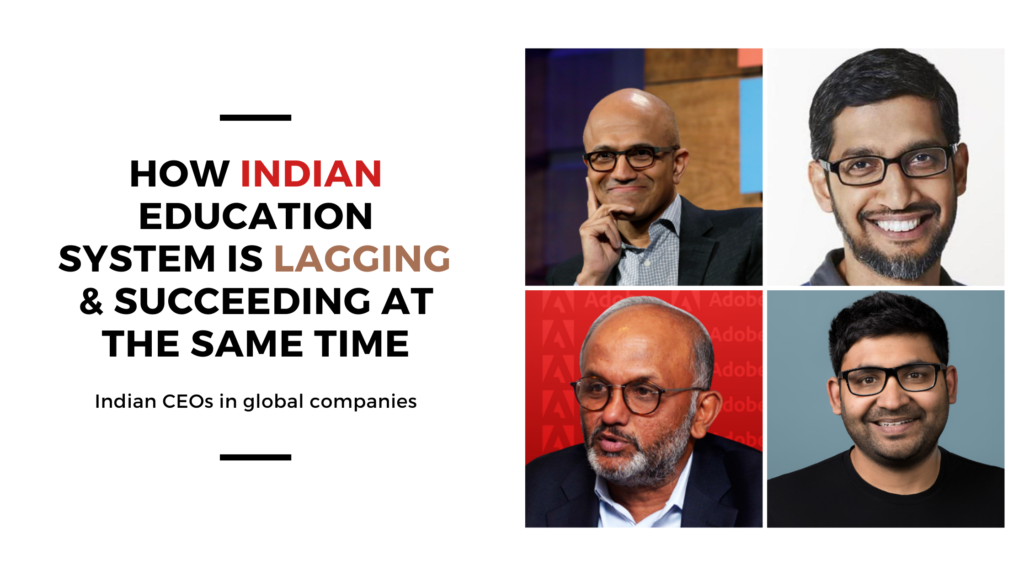How the Indian education system is lagging and succeeding at the same time

The Indian education system has always been under scrutiny for its quality and future. Many questions have been raised time and again on the legitimacy of importance that it holds. On one hand, we have a structure that is considered to be outdated and broken, but on the other hand, we have success stories, or rather say, exceptions that made their way to the world stage to represent the Indian education system and its potential. The world has seen a trend for a while now of Indian CEOs leading major global companies. From major companies like Microsoft, Google, Adobe, and now Twitter, to companies like IBM, Mastercard, Nokia, and many more, are under the successful leadership of Indian CEOs.
Now the question arises that is it safe to give credits to the Indian education system for the initial success of these personalities?
Let’s talk about some of the industry leaders of Indian origin and their educational backgrounds.

The newly elected star Parag Agarwal (CEO of Twitter)
Parag Agarwal was born in Mumbai, Maharashtra, India. His father was a senior official in the Indian Department of Atomic Energy and his mother is a retired school teacher. He studied at Atomic Energy Central School no. 4. Agarwal won a gold medal at the 2001 International Physics Olympiad held in Turkey. He earned 77th rank in the JEE in 2000. Agrawal obtained his B.Tech. degree in Computer Science and Engineering from IIT Bombay in 2005. He later then moved to the United States to pursue a Ph.D. in computer science from Stanford University.
Satya Nadella (Chairman & CEO, Microsoft)
Nadella was born in Hyderabad of present-day Telangana, India into a Telugu-speaking Hindu family. He attended the Hyderabad Public School, Begumpet before receiving a bachelor’s in electrical engineering from the Manipal Institute of Technology in Karnataka in 1988. He later achieved an MS in computer science at the University of Wisconsin-Milwaukee and an MBA from the University of Chicago Booth School of Business in 1997. This Indian gentleman became CEO of Microsoft in 2014 after succeeding Steve Ballmer and recently became chairman of Microsoft after succeeding John W. Thompson in 2021.
Sunder Pichai (CEO of Alphabet and Google)
Pichai was born in Madras (now Chennai) of Tamil Nadu, India. He grew up in a two-room apartment in Ashok Nagar, Chennai with a stenographer wife and an electrical engineer father. He attended school in Jawahar Vidyalaya Senior Secondary School, Chennai, and completed class 12th from Vana Vani school at IIT Madras. He earned his degree from IIT Kharagpur in metallurgical engineering and is a distinguished alumnus from that institution. He later completed MS from Stanford University in materials science and engineering and an MBA from the Wharton School of the University of Pennsylvania. Pichai became CEO of Google in 2015. On October 24, 2015, he stepped into the new position at the completion of the formation of Alphabet Inc., the new holding company for the Google company family. He was appointed to the Alphabet Board of Directors in 2017.
Shantanu Narayen (CEO of Adobe)
Narayen grew up in Hyderabad India, in a Telugu-speaking family, and was the second son of a mother who taught American literature and a father who ran a plastics company. He attended Hyderabad Public School. He earned a bachelor’s degree in electronics and communication engineering from the University College of Engineering, Osmania University in Hyderabad. He moved to the United States to complete his education, and in 1986 received a master’s degree in computer science from Bowling Green State University in Ohio. In 1993 he received an MBA from the Haas School of Business, University of California, Berkeley.

Indian Education System
After the analysis of the above-mentioned success stories, it is safe to say that the Indian education system has lots of potential on its own. We need to keep with the demands of the future and lead as an example. We surely need improvements in our structure from both an educational perspective and an institutional perspective.
How can we make a change on an educational level:
Skill-based Learning
As of now, the Indian education system is such that everyone is forced to study science and math. If this system can be revamped to identify the strengths of a student, then they can be given appropriate training in the chosen field. This will ensure that the child shines in that particular field.
Rural Education
A sad thing about the Indian education system is the fact that its focus is only on urban clusters. There are hardly any decent centers of learning in the rural areas. This is especially true in terms of higher education. If a country has to actually develop, urban and rural development have to go hand in hand.
How can we make a change on an institutional level:
We all know we have incepted in the era of the fourth industrial revolution. We are living in the renaissance of technology and in such a state, technology and the education system cannot be kept apart. institutions need to be upgraded as it is home to education. Upgraded with technology like institution management software that can help in overall assistance in management. Various other solutions are also available, like for efficient management of homework and attendance, institutes can use homework management software or attendance management software. This could really upgrade educational institutions be it college, school, or coaching institutes. Fees management software can sort fee managing and make it a hassle-free process. For keeping up with the time of pandemic institutes should also take steps to make distance education easier. This problem can be sorted by timetable management software, live classrooms software, etc.
Read this interesting blog on how the education system is transforming with the technology
Visit our website here:

